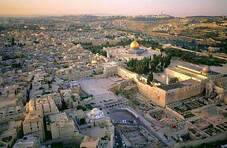Does the Quran prophesize the state of Israel and the current conflict in the Holy land? One of greatest calamities to have faced the Ummah for over half a century has been the establishment of the state of Israel. A number of Modern day scholars are of the opinion that the beginning ayaat of Surat Al Isra speak of Israel and its destruction. This is based on a number of details mentioned in the Quran that if we look at history, can only be attributed to the modern state of Israel. As a starting point one needs to understand that classical scholars and commentators were missing a vital tool when interpreting ayaat referring to events, specifically those events that have yet to occur. Allah Most High says: سَنُرِيهِمْ آيَاتِنَا فِي الْآفَاقِ وَفِي أَنفُسِهِمْ حَتَّىٰ يَتَبَيَّنَ لَهُمْ أَنَّهُ الْحَقُّ ۗ أَوَلَمْ يَكْفِ بِرَبِّكَ أَنَّهُ عَلَىٰ كُلِّ شَيْءٍ شَهِيدٌ We will soon show them Our signs in the horizons and within themselves until it becomes clear to them that it is the truth. But is it not sufficient concerning your Lord that He is, over all things, a Witness? [Surat Fussilat 41:53] It would be no surprise to understand that the political environment at the time did influence Quranic interpretation of ayaat speaking of future events. The scholars of the past did their utmost to arrive at the correct meanings and understandings of certain ayaat but in some instances interpreted them out of context because there was no other way to understand them. Telling a classical exegete that someday a small jewish state would emerge and become a superpower and oppressive state in the Holy land while Muslims were helpless to do a thing would be like telling someone today that a time will come when the US, Russia and China would stop manufacturing armaments and work for world peace and equality for all! The main theme of Surat Al-Isra ( Surat Bani Israel) The Surah we will be examining is Surat Al Isra, a Surah which begins by mentioning and describing The Prophet's night journey to masjid Al Aqsa as well as the great corruption caused by the Children of Israel in the Holy land, The central focus of the Surah is the importance of making Allah alone the disposer of all our affairs by following his guidance in the Quran. There is no Surah which speaks about the Quran and Al-Insaan ( refined human) more than Surat Al Isra. Through following the divine guidance and turning to Allah we gain our humanity and when we neglect this we have the potential to reach the lowest of the low as the Children of Israel in our time. The final promise ( وَعْدُ الْآخِرَة) – In this world or the next ? The term وَعْدُ الْآخِرَة "The final promise" occurs only twice in the Quran and both instances are appropriately mentioned in Surat Al-Isra; once in the beginning and once in the end of the Surah. Based on the context, this term is used for an event that will take place in the future and that will occur in the Holy Land at Masjid Al Aqsa and the blessed land surrounding it. The Quran speaks of the first promise and the final promise One will notice that the verbs used in the ayah for the first promise are all past tense verbs بَعَثْنَا We sent فَجَاسُوا They passed into وَكَانَ وَعْدًا مَّفْعُولًا It was a promise that came to pass while the verbs used in the final promise are present tense verbs لِيَسُوءُو That they will uncover the evil of your faces لِيَدْخُلُو ' That they will enter لِيُتَبِّرُو That they will utterly destroy A number of Scholars of the past understood that the ayaat related to the final promise were speaking of the future but interpreted them as ayaat speaking of the hereafter. Some understood that it was in this life, but that it had already occurred. Some consider that it refers to the opening of Jerusalem by the Caliph Umar Ibn Al khataab RA although this interpretation is quite problematic as the Children of Israel did not have control over Jerusalem at the time and were not causing widespread corruption throughout the land ( as described in the Quran). The 2 major acts of corruption The Quran says: وَقَضَيْنَا إِلَىٰ بَنِي إِسْرَائِيلَ فِي الْكِتَابِ لَتُفْسِدُنَّ فِي الْأَرْضِ مَرَّتَيْنِ وَلَتَعْلُنَّ عُلُوًّا كَبِيرًا And We conveyed to the Children of Israel in the Scripture that you will surely cause corruption on the earth twice, and you will surely reach [a degree of] great haughtiness. [Surat Al Isra 17:4] A few things to note about his ayah. 1. The corruption stated here is not corruption on an individual or group scale which occurs all the time. Since the word "twice" was used, it is speaking about the corruption of the Children of Israel as a nation. 2. The corruption occurs in Al A'rd i.e. the land. It's not corruption specific to a particular area. Some commentators have stated that "The land" is the "Holy land" but Allah SWT does not qualify which land it is. What is understood from the actual wording is that the corruption will be throughout the land, and would be significant enough to warrant a punishment from Allah (SWT). 3. The ayah indicates that the influence and power made the Children of Israel reach a great level of haughtiness. In fact the Quran used 4 levels of emphasis to capture their internal state: وَلَتَعْلُنَّ عُلُوًّا كَبِيرًا you will surely reach [a degree of] great haughtiness. [Surat Al Isra 17:4] These 4 levels of emphasis are: 1. Lam of emphasis 2. Noon of emphasis 3. Maf'oolun Mutlaq ( Absolute Object) 4. Describing it with the word Kabeer ( Great). Even Firoun's haughtiness was not described to the same extent. The Quran says regarding Firoun وَإِنَّ فِرْعَوْنَ لَعَالٍ فِي الْأَرْضِ وَإِنَّهُ لَمِنَ الْمُسْرِفِينَ And indeed, Firoun was haughty within the land, and indeed, he was of the transgressors [Surat Yunus 10:83] Note: Although double emphasis is used in the ayah, the emphasis is on "Firoun being haughty in the land" as opposed to the ayah speaking about the Children of Israel which doesn't emphasise the fact that they will become haughty but rather it emphasises ( 4 times) the great degree of haughtiness they will reach. The first promise Allah says: إِذَا جَاءَ وَعْدُ أُولَاهُمَا بَعَثْنَا عَلَيْكُمْ عِبَادًا لَّنَا أُولِي بَأْسٍ شَدِيدٍ فَجَاسُوا خِلَالَ الدِّيَارِ ۚ وَكَانَ وَعْدًا مَّفْعُولًا "When the first of the promises came to pass, We sent against you Our servants given to terrible warfare: They penetrated the very innermost parts of your homes; and it was a promise (completely) fulfilled." [Surat Al Isra 17:5] One should note that this prophecy is also found in the Jewish Bible. The corruption of the Israelites began following the death of King Suleiman AS in approx 935 BC. The Children of Israel began to decay spiritually and corruption became widespread. Whenever the scale of corruption increased so did the intensity of the enemies sent by Allah. There were constant conflicts and skirmishes until the Northern kingdom was destroyed by the Assyrians completely in the year 722 BC. Following the invasion, most of the Jewish tribes were either killed or taken as slaves. The skirmishes and attacks continued against the Southern Kingdom until it was destroyed by the Babylonians in 586 BC. This marked the end of the last independent kingdom of the Israelites. The Israelites never regained power over the holy land until 1948 with the formation of the zionist jewish state. This is why we find many contemporary scholars maintain that the second of the promises refers specifically to the destruction of the state of Israel. In describing these attacking armies, the Quran uses the term that is not found anywhere in the Quran عِبَادًا لَّنَا Servants of Ours [Surat Al Isra 17:5] The term that is usually used in the Quran is عِبَادَنَا Our servants What is the grammatical significance of this usage If I said for example ابني عَاقِلٌ My son is intelligent. Here the emphasis is on my son since there is ascription ( Idhafa) of him being my son. There is also a sense of pride on the part of the one saying this. but if I said ابنٌ لي عَاقِلٌ A son of mine is intelligent. In this example the son is not defined therefore there is emphasis on intelligence with no mention of which of my sons it is. So the term used in the ayah is indefinite and does not define a specific group or army. Also unlike the later term, there is no honoring but rather there is emphasis on the quality that is associated with the servants i.e. أُولِي بَأْسٍ شَدِيدٍ those of great military might.[Surat Al Isra 17:5] Why then is not the word for Army ( جُنُود or جَيش ) used to describe them? Because there is also another rhetorical aspect to this. Using this title (عِبَادًا servants) which is reserved for believers and using it for an invading army who were not believers shows: 1. How far the Israelites had strayed from Allah Most high and to add insult to injury, their enemies are described with a title that they should have been called. 2.The invading armies were, by the permission of Allah SWT, used as a divine punishment for a people who had turned away from Allah SWT! This promise was fulfilled prior to the revelation of the Quran being sent as stated in the ayah وَكَانَ وَعْدًا مَّفْعُولًا and it was a promise (completely) fulfilled [Surat Al Isra 17:5] To be continued By Nabeel Alkhalidy
3 Comments
|
Nabeel AlkhalidyHead teacher of the Sibaway Institute. Archives
February 2022
Categories
All
|
THE SIBAWAY INSTITUTE |

 RSS Feed
RSS Feed

